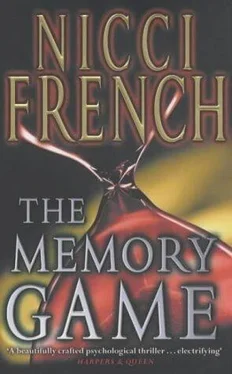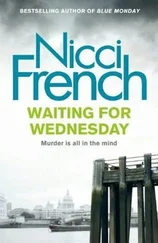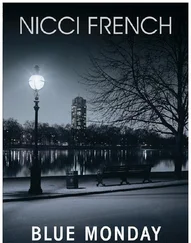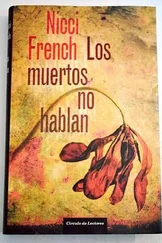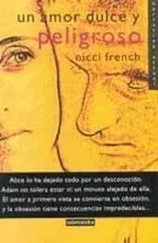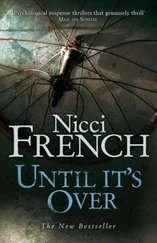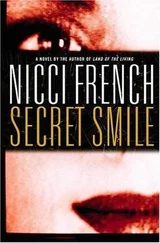Nicci French - The Memory Game
Здесь есть возможность читать онлайн «Nicci French - The Memory Game» весь текст электронной книги совершенно бесплатно (целиком полную версию без сокращений). В некоторых случаях можно слушать аудио, скачать через торрент в формате fb2 и присутствует краткое содержание. Жанр: Триллер, на английском языке. Описание произведения, (предисловие) а так же отзывы посетителей доступны на портале библиотеки ЛибКат.
- Название:The Memory Game
- Автор:
- Жанр:
- Год:неизвестен
- ISBN:нет данных
- Рейтинг книги:4 / 5. Голосов: 1
-
Избранное:Добавить в избранное
- Отзывы:
-
Ваша оценка:
- 80
- 1
- 2
- 3
- 4
- 5
The Memory Game: краткое содержание, описание и аннотация
Предлагаем к чтению аннотацию, описание, краткое содержание или предисловие (зависит от того, что написал сам автор книги «The Memory Game»). Если вы не нашли необходимую информацию о книге — напишите в комментариях, мы постараемся отыскать её.
The Memory Game — читать онлайн бесплатно полную книгу (весь текст) целиком
Ниже представлен текст книги, разбитый по страницам. Система сохранения места последней прочитанной страницы, позволяет с удобством читать онлайн бесплатно книгу «The Memory Game», без необходимости каждый раз заново искать на чём Вы остановились. Поставьте закладку, и сможете в любой момент перейти на страницу, на которой закончили чтение.
Интервал:
Закладка:
Alex hardly followed up the things that I expected would interest him. Sometimes it seemed almost a matter of pride, as if he had to demonstrate his independence. He listened with concentration to the account of my wavering attitude towards Alan but then he went back yet again to my memories, or non-memories, of the river bank on the afternoon when Natalie was last seen. This time I actually showed some impatience. He was insistent.
‘I’ll follow you in whatever you want to talk about,’ he said. ‘But I would like you to indulge my interest in this. Something you said to me very early on interested me. You said, “I was there.’“
‘I don’t remember if I used those exact words, but it’s not such a big deal. All I meant was that I was on the river bank close to where Natalie was last seen. You can’t read all that much into it.’
‘I’m not reading anything into it. I’m listening to you. That’s what you pay me for. “I was there. I was there.” An interesting choice of words, don’t you think?’
‘Not really.’
‘I think it is.’
Alex got up and paced around the room as he always did when he was being theatrically excited. Being behind me and out of sight wasn’t enough at moments like these. He wanted to be higher than I was, to dominate me.
‘You’re being woolly, just because we’re dealing with words and emotions. You wouldn’t be like this in your work, would you? If you had a plan of a house twenty metres wide and a site fifteen metres wide, you wouldn’t just go ahead and build the building and hope that it would somehow work out along the way. You would redesign the building to fit the space. It may be that all we need to do is iron out the discrepancies in what you’ve said to me. You’ve said that you come from a perfect happy family and yet one of the family was killed and you say it couldn’t have been someone from outside. How can we make those statements fit together? You tell me that you were there, and yet you weren’t there. How can that make sense? Were you in reality not there, or do we have to get you there?’
‘What do you mean, “get me there”?’
‘You have come to me with a story with strange dark holes in it, with walls that need to be breached. Let’s strike a bargain, Jane. I’m going to stop being a bully, I promise. We’ll talk about the things you want to talk about, for the time being at any rate. However’ – he held up a finger – ‘there will be one exception. I want us to stay with this scene by the river, I want you to go back into it, to inhabit it, to explore it.’
‘Alex, I’ve told you everything I can possibly remember about that afternoon.’
‘Yes, I know. And you’re doing well, perhaps better than you realise. What I want you to do now is stop trying to remember. You can free yourself from all that. I’d like to try to repeat the exercise we did the other day.’
So we went through that process. I closed my eyes and relaxed and Alex talked soothingly to me and I tried to put myself back by the river, leaning against the stone, there on that summer afternoon. I was better at it now. The first time the scene had appeared like one of those supposedly three-dimensional photographs. They give an illusion of depth but it’s not a depth you can put your hand into. This was different. I could yield to it. I was in a space I could walk through, a world in which I could lose myself. Alex’s voice seemed to come from outside. I described to him what I experienced. I was sitting down, my back resting on the dry mossy stone at the foot of Cree’s Top, the river on my left flowing away, the last screwed up pieces of paper floating round the curve ahead of me. The elms on the edge of the wood on my right.
Alex’s voice from outside my world asked me if I could stand up and I could without any difficulty. He asked me if I could turn round. Yes, I could. I told him that the river was now on my right flowing towards me and away behind me, the elms and the wood were on my left. Now I was looking up the little hill of Cree’s Top. Alex’s voice told me that he didn’t want me to move or to do anything. All he wanted to know was, could I see the path? Of course I could. There were thick bushes by the side, and it occasionally disappeared from view as it snaked its way up the slope, but I could see almost all of it. Very good, said Alex. All he wanted me to do now, he said, was to turn round once more and sit down in my original position. No problem. Very good, he said. Very good.
Sixteen
Days were up and down, but I surprised myself by coping. Take a typical example, a sunny Monday morning early in December. It was one of those days that occur every so often on which women are encouraged to bring a schoolgirl to work with them in order, supposedly, to make their jobs seem less alarming. I couldn’t help feeling that anybody who contemplated my working life would suddenly find herself attracted to the kitchen and nursery, but I decided I must make the gesture. So I rang up Peggy, whom I always felt I never rang up quite often enough. Evidently, Emily, the middle girl of Paul’s previous family (she’s almost sixteen), was slowest in thinking up a plausible excuse and she was offered up to me for the day.
Just after nine o’clock in the morning she slouched down her garden path, Peggy waving unnoticed behind her. She was dressed in black like a Greek widow, though with the rings through her nose she was unlikely to be mistaken for one. She sat in the passenger seat, switched Start the Week off and we headed east from Kentish Town. I asked after Peggy and Emily grunted something and asked about Robert. I muttered a non-committal pleasantry and said he seemed to be getting on well with his new girlfriend. I feel protective about my nieces where my predatory youngest son is concerned and I’ve talked to him, and to Jerome as well, about their duty to look after their younger cousins. I was edgy, mainly because I would normally have been smoking but Emily would have probably wanted to join me and so I had decided in advance to give up for a morning.
I love my sons but when they were growing up the house did sometimes feel like a sports changing room. Perhaps in reaction to this I have always felt a special pang of affection for the three bolshy Crane girls. I sometimes worried that I might try too hard with them and put them off me but as we stopped and started along York Way, Emily chatted with what – for her, at least – was remarkable fluency. I asked her if she had heard anything about Paul’s documentary. Emily rolled her eyes, as she did in response to almost anything to do with her father.
‘Silly man,’ she said.
I felt obliged to be soothing.
‘No, Emily, I’m sure it’ll be very interesting.’
‘You want to be on telly, do you, with everybody knowing about your family?’
‘No, not really.’
‘We’re all refusing to be in it. Dad got really cross. Cath called him a voyeur.’
‘Well, at least Paul must be pleased to hear her using a French word. If only she’d called him an auteur.’
We giggled together. We arrived, late as always, at the hostel where there were two council employees waiting, neither of whom I’d met before. Pandora Webb, an intermediate treatment officer. And Carolyn Salkin, a disability officer. In a wheelchair. At the foot of the steep concrete steps leading to the front door. Carolyn’s hair was cut very short, giving her the air of a fierce sprite. She was the sort of person I would have taken to immediately if I had met her anywhere but in front of my precious project. She came bluntly to the point.
‘There is evidently no wheelchair access in your plans, Ms Martello.’
‘Please call me Jane,’ I panted. ‘And this is my niece, Emily.’
Читать дальшеИнтервал:
Закладка:
Похожие книги на «The Memory Game»
Представляем Вашему вниманию похожие книги на «The Memory Game» списком для выбора. Мы отобрали схожую по названию и смыслу литературу в надежде предоставить читателям больше вариантов отыскать новые, интересные, ещё непрочитанные произведения.
Обсуждение, отзывы о книге «The Memory Game» и просто собственные мнения читателей. Оставьте ваши комментарии, напишите, что Вы думаете о произведении, его смысле или главных героях. Укажите что конкретно понравилось, а что нет, и почему Вы так считаете.
